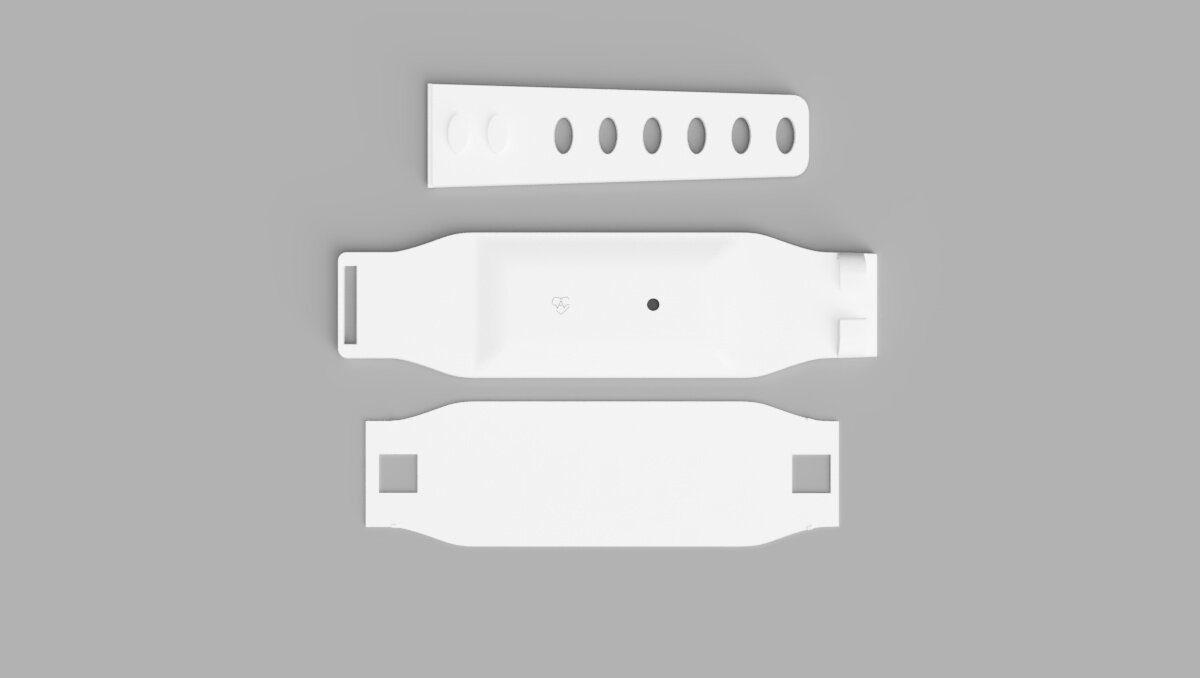Under construction to update the look and content.
Portable ECG.
-
Case.
Student project/ Master thesis.
2021.
-
Team.
Natalie Bhanji Olsson.
In collaboration with Auricula AB.
-
My role.
Discovery/ Development/ Testing.
A medical horror story that is not often discussed is that today, 1 in 4 people that are older than 40 years, is estimated to at least once in their lifetime obtain atrial fibrillation, and up to 40% of those who suffer from this won't ever be diagnosed. Together with Auricula AB, we sought for a solution to this problem. The answer became a portable ECG monitor that can be carried on the arm during the night and that is connected to an app on the user's phone to record bioelectrical signals, that later can be used for diagnosis by the doctor and as a base for discussion of treatment plans.
The product can be used at home by the patient themselves, which can ease the pressure on the healthcare system, it opens up for communication between patient and medical professionals and also improves the patients life quality.
Why large numbers of undiagnosed suffers of atrial fibrillation?
intermittent disease
underreporting among the oldest
those who have only gone to primary care
people having such as mild symptoms the desis can be
missed
atrial fibrillation can be mistaken for other diagnoses
such as; Anxiety or panic attacks, Tachycardia and other arrhythmias, Hyperthyroidism (Graves disease) or under- lying heart disorders
(Riksförbundet HjärtLung, 2018)
Why is this important?
Undiagnosed or untreated the disease increases the risk of stroke and heart failure, this risk increases with age and/or conditions such as diabetes or heart disease (Riksförbundet HjärtLung, 2018 & SBU, 2013).
Problem.
1 in 4 people, that is older than 40years, is estimated to at least ones in their lifetime obtain atrial fibrillation.
Up to 40% of all that suffers by atrial fibrillation is undiagnosed.
In Sweden, 2018, there are over 370 000 people that suffer from atrial fibrillation and if all those that undiagnosed is included
there may be over half a million people living with the disease.
One of the most common reasons why Swedish people are hospitalized
There is a high pressure on the healthcare system, with an increased elder population an increase in the disease is following.
22% of hospital admission, in 2009, was because of atrial fibrillation. The cost of care for patients with the disease is amestated to be 5,8 billion in the EU, most of the cost is hospitalization, transport, doctors appointments, medicine or/and treatment during complications.
(Riksförbundet HjärtLung, 2018 & Ericsson, Lisa et al. 2011).
Interviews
“I felt sick and worried! I often had to lie down on the couch in front of the TV to distract myself from my heart racing.”
— Kenneth, 61 years old.
“They (the doctors) created a concern. First they scare you and then nothing happens, you are neglected. I was left out in the void.”
— Richard, 62 years of age.
There is an opportunity to reduce negative emotions for the patient, such as the feeling of confusion or anxiety, other feelings such as embarrassment when needed to take off clothing, when doctor or nurses need to touch a female patient’s breast or shave the hair on the patient’s chest to connect the sensors. There is also a good opportunity to improve physical comfort for the patient, this to improve sleep.
- User's journey and Emotional journey
“How may I design a portable medical product that is used by the patient at home to communicate bioelectrical signals to their healthcare system, with support of Auricula AB technical innovation, that achieves the medical requirement and the stakeholders needs comprehension, function, emotional and usability?”
“Think of it as a pill, you want it to be easy to swallow. When you look at it, you do not want it to feel too big. It should be small and round and... yes... Same with machines. You want it to look nice. You do not want to feel unwell when you look at it.”
Result Interview
From the interviews it was learned:
there is a need for information about the diagnoses, their result and the possibility to ask
questions for the patient
patients can feel worried and left alone with their diagnosis the
users’ emotional needs
the users’ phone and charger habits
examples of the users’ lifestyle and morning routines
responds towards the product
potential changes to the product
Support doctors and patients.


Example of product in use.















